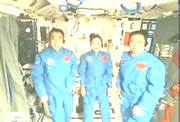Fishing is a popular activity and every fisherman knows the rule: Keep the big ones, throw the smaller ones back. The idea behind Lt is simple - the larger fish are probably older. If you keep the smaller ones, they won’t be able to reproduce, and the fish population is in danger.
But fishing out the largest fish from a population has an unwanted effect: Over time, fewer adult fish get really big. If only the smaller fish reproduce(繁殖), then future generations become smaller. This is an example of evolution(进化) in action.
One scientist, Dr David Conover has spent the last decade studying the effects of the “keep the big ones” rule and if they can be reversed(颠倒).
To set up his experiment, Conover and his team caught hundreds of silverside fish and divided them into six groups. For two groups, Conover followed the “keep the large ones” rule and took out the biggest fish. For two other groups, he removed only the small fish.
For the last two groups, he removed fish at random (随意的).
After five years, he measured the fish in each group. In the two groups where the largest fish were regularly removed, the average fish size was smaller than the average size in the other groups. Here was evolution in action: If only small fish survive to reproduce, then future generations of fish will also tend to be small.
For the second five years of his experiment, Conover changed the rules and took fish randomly from each group. At the end of the experiment, he found that the fish that were in the “keep the large ones” group for the first five years had started to get larger again, although he calculated it would take at least 12 years for the fish in that group to return to their original size.
In other words, it takes less time to shrink(变小) than it does to recover.
小题1: The underlined word “it” (Line 2) refers to “ ”
| A.the activity | B.the fish |
| C.the rule | D.the fisherman |
小题2:Why do many people follow the “keep the big ones, throw the small ones back” rule?
| A.It helps to protect fish numbers. |
| B.It helps to protect fish size. |
| C.It is the custom in most countries. |
| D.They will be punished if they don’t. |
小题3:What did Conover find after the first five years of his experiment?
| A.The “keep the big ones” rule made no difference to fish size. |
| B.The “keep the big ones” rule made fish smaller on average. |
| C.The “keep the big ones” rule made the fish bigger on average. |
| D.The “keep the big ones” rule affected all fish populations in the same way. |
小题4: What is the author’s intention in writing this article?
| A.To encourage people to fish more carefully. |
| B.To urge governments to change the rules of fishing. |
| C.To describe the results of a scientific experiment. |
| D.To introduce the rules of fishing to readers. |






